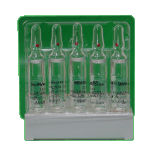Cerebrum compositum (Homeopathic remedies Heel)
Injection

Composition : 100 ml contains: Cerebrum D8, Embryo D10, Hepar D10, Placenta D10, Kalium Phosphoricum D6, Selenium D10, Thuja D6, Ignatia D8, Bothrops lanceolatus D10, Acidum Phosphoricum D10, China D4, Manganum phosphoricum D8, Magnesium phosphoricum D10, Anacardium D6, Conium D4, Luesinum D13, Medorrhinum D13, Hyoscyamus D6, Aconitum D6, Cocculus D4, Ambra D10, Sulfur D10, Kalium bichromicum D8, Gelsemium D4, Ruta D4, Arnica D28, Aesculus D4 1 ml.
Indication: Stimulation of regeneration processes and nonspecific immunity in the retardation in mental and physical development in children; Legasthenia, autonomic dystonia, depression, atherosclerosis; Condition after concussion of the brain, encephalitis; Neuralgia, neurotic states; Amyotrophic lateral sclerosis, multiple sclerosis, Parkinson's disease; Memory disorders, neurasthenia and other geriatric changes.
Contraindications: None known.
Side effects: In some cases, skin allergic reactions are possible, which requires immediate withdrawal of the drug.
Combined application with other means: No special features.
Dosage: Usually 1-3 times a week for 1 ampoule subcutaneously, intramuscularly, intradermally, if necessary, intravenously.
Form of release and packing: The package contains 5, 10, 50 or 100 ampoules of 2.2 ml.
Brief description of the indications for the use of individual components of the formulation: Cerebrum suis States of mental exhaustion. Developmental disorders. Disorders of cerebral circulation with subsequent violations of cerebral functions. Embryo suis Nonspecific stimulation of the body's defense systems, especially in the cellular phase of homotoxicosis. Arteriosclerosis. Hepar suis Stimulation of detoxification functions of the liver. Peripheral blood circulation disorders. Kalium phosphoricum Depressive states and conditions of exhaustion. Conditions after physical or emotional overstrain and severe illnesses. In addition: nervous insomnia followed by daytime sluggishness. Memory loss. Selenium Gastrointestinal disorders. General impotence. In addition: forgetfulness, violation of concentration of care. Thuja Gastrointestinal disorders. Reducing the disposition of the spirit. Disorders of the word. Ignatia Nervous disorders. Reducing the disposition of the spirit. Spasms of the hollow organs and muscle cramps. Bothrops lanceolatus Bleeding, blood clotting disorders. Diseases of blood vessels. In addition: a disorder of the word and memory. Acidum phosphoricum States of physical and mental exhaustion. China Anemia. General exhaustion. Neuralgia. Manganum phosphoricum Decreased memory. Conditions of exhaustion with anemia. The need for microelements, especially for enzymatic disorders of the Krebs cycle. Magnesium phosphoricum Neuralgia. Painful spasms of the gastrointestinal tract. Anacardium Digestive disorders. Mental exhaustion. Disorders of the disposition of the spirit. Rave. Conium Calcification of cerebral vessels (cerebrosclerosis with dizziness of hypoxic origin). Paralysis. Neoplasms of different localization. Disorders of the disposition of the spirit. Luesinum Night pain, especially cephalalgia and bone pain. Insomnia. States of fear, reduction of the disposition of the spirit. In addition: memory loss, depression. Medication disorders (eccentricity). Premature aging. In addition: a decrease in memory (especially short-term), nervousness, headaches. Hyoscyamus Anxiety and irritability. Sleep disorders. Spastic conditions of the respiratory and gastrointestinal tract. Aconitum Nervous diseases with neuralgia. Acute disorders of cardiac activity with attacks of fear. Vertigo Cocculus of various origins. Calcification of cerebral vessels (cerebrosclerosis). Pain in the back of the head. Convulsions and nervous states, including as a result of a lack of sleep. Ambra Syndrome of irritable weakness and nervous exhaustion. Sleep disorders. Vegetative disorders. Depressed mood. Vascular calcification. Premature aging. Sulfur Cardiovascular diseases, blood pressure disorders. Sleep disorders, neurotic disorders. Weakness. Violations of behavior and mood. Kalium bichromicum Inflammation of mucous respiratory and urinary tract, gastrointestinal tract. Pustulate skin diseases. Neuralgia. Rheumatism. In addition: periodic pain in the frontal region. Gelsemium of the Cefalgia . Neurotic disorders. Paralysis and convulsions. Ruta Physical states of overstrain (eg, headaches and asthenopia after visual overexertion). Arnica Any bleeding. Myalgia after exercise. Diseases of the arteries and veins. Aesculus Disturbances of venous blood flow. Hemorrhoids. Lumbosacral pain.
Cerebrum compositum not only affects the functions of the brain (including memory), but also prevents arteriosclerosis caused by blood flow disorders and the associated decline in mental abilities in people of all ages, especially under stress. It is recommended that Hepar compositum (activation of detoxification functions of the liver), Testis compositum (for men) and Ovarium compositum (for women), Populus compositum, Placenta compositum (improvement of peripheral circulation), Rauwolfia compositum (with hypertension), Cor compositum Weakening of the myocardium and disorders of the blood supply of the heart), Tonico-Injeel (physical weakness), Neuro-Injeel (improvement of mental state), Lymphomyosot (for drainage therapy), but with suspicions of precarcinosis or neoplasm - Coenzyme compositum, Ubichinon compositum, Thyreoidea compositum, Glyoxal Compositum (1 injection). The preparation Cerebrum compositum is similarly shown at various organic nervous diseases and at migraines, especially in a combination to other antihomotoxic preparations (for example, Galium-Heel).


Comments
When commenting on, remember that the content and tone of your message can hurt the feelings of real people, show respect and tolerance to your interlocutors even if you do not share their opinion, your behavior in the conditions of freedom of expression and anonymity provided by the Internet, changes Not only virtual, but also the real world. All comments are hidden from the index, spam is controlled.